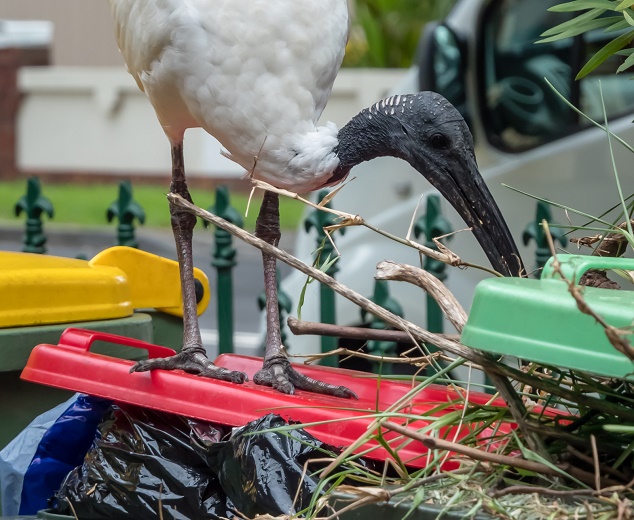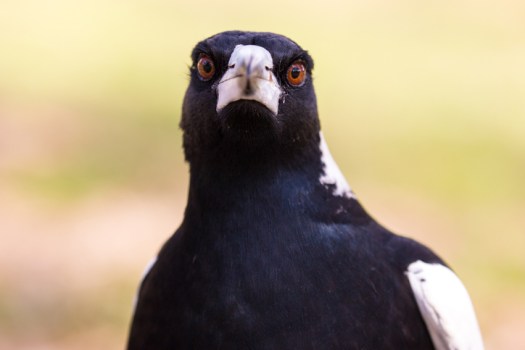
A Sydney council that has considered resorting to bird spikes, bright lights and electric pulses to control its growing ibis population is now calling on the NSW government to develop a plan to manage the ubiquitous birds.
Canterbury-Bankstown Council has written to the state government to request the development of a metropolitan-wide response to the management of the species in the urban environment after a motion was carried at a council meeting last December.
“Ibis have colonised many of our parks and urban streets and this has brought with it many challenges, including them scavenging in rubbish and nesting in inappropriate locations,” a council spokesperson told Government News.
In 2018, Council developed its Australian White Ibis Management Plan, identifying how to best manage ibis in the urban environment, with recommendations on monitoring and controlling colony populations.
“While Council can undertake some controls, licences are required to remove ibis nests and eggs where they are causing health or environmental impacts,” a Council spokesperson said.
“This is not unreasonable. However, there are opportunities for more leadership and coordination from the state government around this issue, including streamlining this process.”
A public nuisance
The Australian white ibis, Threskiornis molucca, is one of three native species of ibis found in Australia and is protected under the NSW Biodiversity Conservation Act 2016. However, they have become a problem because they are taking over urban parks and gardens.
According to a national white ibis survey overseen by the NSW department of environment, there were 5,694 ibis in the Sydney region in 2015.
“Their overabundance can result in a range of negative impacts including degradation of native vegetation, reduced biodiversity, contamination of water bodies, a risk for disease transfer to livestock industries and humans, and potential risk to air safety,” the management plan says.
The main issues for Council relates to the species being a public nuisance. It receives numerous complaints from nearby residents regarding noise, smell and accumulated excrement from ibises, the management plan says.
“Noise is a significant issue as the breeding season coincides with the early sunrises of spring and summer. It is common for ibis to start making noise from 4am onwards. The smell of droppings, carcasses and broken eggs, magnified by the summer heat, also contributes to public concern.”
They are also creating a bird strike problem at Bankstown Airport, the plan says.
According to the Australian Transport Safety Bureau (ATSB), there were 39 bird strikes involving ibis at Australian airports between 1991 and 2001.
Reducing ibis population
Due to the ibis being a protected species, Council is limited in its ability to intervene with breeding. However, Council has come up with a few solutions in its management plan.
One way to reduce the ibis population is to restrict access to food sources, particularly at waste landfills, the plan says.
“In urban environments, landfill sites provide a food source for ibis, often resulting in large numbers flying in to forage and significantly contributing to an artificially inflated population.”
To maintain the ibis population below a certain threshold, Council proposed applying management actions if the population exceeds this threshold.
This includes installing bird spikes to deter birds from landing, wire strands to make perching areas unstable, bright lights to reduce attractiveness of evening roosting areas, and electrified tracks to emit an irritating pulse to deter perching.
Council has set a target population for ibis in the council local government area of between 1,000 and 2,200 birds.
“This was determined through examination of the current population size, area of preferred ibis habitat and current strike history at Bankstown Airport,” the plan said.
Campbelltown City Council has ibis management plans in place for several of its sites, including Lake Mandurama, Ambarvale and Eagle Vale Pond, Eagle Vale.
“Council has previously advocated for a standard set of ibis management guidelines from the NSW Government and still believes this is needed to more effectively manage ibis populations,” Director City Delivery Kevin Lynch told Government News.
Camden Council also has an ibis management plan. “Council has been actively managing the Australian white ibis population at Lake Annan in Mount Annan since 2012,” a spokesperson told Government News.
A DPIE spokesman did not comment on the state government’s role in devising a metropolitan management plan but said community education, including discouraging feeding the birds, could help mitigate interactions between ibis and people.
Comment below to have your say on this story.
If you have a news story or tip-off, get in touch at editorial@governmentnews.com.au.
Sign up to the Government News newsletter

What does the term “management” mean in this context? Wouldn’t passive measures just move the problem elsewhere (the one “we” caused through urbanisation)?
We have problems with White Ibis for the last few years, they’re nesting on my next door neighbor’s 7meters high palm tree. They came to my front yard garden everyday, making lots of noise & dirts. They stay on my roof & turn all my black tile roof into white. It’s very dirty & stinky. I just don’t want to step outside, the air isn’t fresh anymore. It’s really unfair for us & our neighbors to face with this Ibis issues for so long.
The next door owner didn’t care because she don’t live there, she rent the house out to the tenant, she don’t border to do anything. I have contacted the local council, the land & environment office, the local MP, the Ibis management services. But none of them can help me, they all just passing me around with referring to different numbers. It’s very disappointed & hopeless with those services.
Cindy has described our problem perfectly – not only the many problems (noise, smell, excrement) with the presence of large numbers of ibis in our neighbour’s tree but with the “passing me around with referring to different numbers” issue Cindy had.
I rang Cumberland Council who stated that it was not their problem (not even the health and safety issue of residents was acknowledged) and fobbed me off onto WIRES. WIRES said they only deal with rescuing birds, told me that Councils fob residents off onto them regularly and incorrectly. WIRES put me through to NSW Parks and Wildlife who said I said been put through to the wrong office and they gave me the number for the Office of Environment and Heritage. They batted me back to a different NSW Parks and Wildlife office at Pitt Town.
Finally, at this number I spoke to a sympathetic and patient ranger who could give me clear information about the ibis population and the following suggestions while admitting that it is a widespread and unpleasant problem and there is no solution because ibis are native and therefore protected:
1) ‘pineappling’ the palm tree to remove horizontal branches and discourage nesting/roosting (v costly and what if neighbours don’t want to pay/get tree trimmed)
2) making clanging noises – pots and pans hit with metal objects (disturbs neighbours)
3) shining strong spotlight into tree at roosting time/evening to disturb and discourage (negotiate with neighbour first, don’t do this when birds are nesting)
4) removing all food and water sources is no guarantee – ibis will happily fly a couple of kms away to the nearest McDonald’s/shopping centre and bring back ample food supply
None of this is at all satisfactory and online tsk tsk comments about saving native wildlife, human encroachment on habitats and urban sprawl etc are of little efficacy or use.
I live Rockdale.
THE ibis birds sleep in the gum/eucalyptus trees of which there are 2 trees, about 5-6 stories tall growing in the yard.
The noise and mess is unbearable; I mind my little grandchildren and they like to play in the yard but the excrement the birds leave all over the plants, the last ing, the footpath and the outside play equipment is very distressing.
I wanted the trees removed but didn’t have any luck with my council. Branches drop and the situation is dangerous and unhealthy for all of us.
I live in Marrickville, there are quite many ibis around where I live. They make so much noises, scavenging in rubbish and damage our gardens.
I think Council to take this problem seriously as their number is growing. We feel it’s not safe in terms of public health.
I have called council on numerous occasions that have inhabited a huge tree in our backyard. They swim in the pool and leave droppings everywhere. It smells like a farm and I have now found dead birds on the grass and in the pool. I have asked the owner to submit a proposal to get the tree removed months ago! No response from Bankstown Council, I have tried everything. Wasting hundreds of dollars on chemicals and high pressure cleaning! They are the worst pets!!
These birds are an ancient gentle and kind natives that have lost their habitat thanks to human development in wetlands. What a pathetic article. Take your poor me complaints and your ignorant stupid comments and go back to the 20th century!
There are sulphur crested white parrots on Peakhurst Park. You can talk to them and they respond. Ibis might think to ibis company have dropped in. I have noticed people do hate Ibis except about four neighbors I suspect feed them Ibis bond to you and follow me to shops and worry me about getting run over Well they are cute fluffy little white birds and do not bite. I miss them I suspect they were culled 30 birds last ime I counted Likely some of the increase were drop-in birds. That means they will come possibly attracted sulphur crested white parrots now an Ibis might poo on the roof parrots can make holes in the roof. I might suggest a local zoo leaflets can be handed out advice given people need to learn and perhaps accessories sold dog owners want a leash free. That could be managed with permission at set times. The local zoo can be an attraction focussing on birds and small animals a mouse plague is on the way people ought to know about ferret ownership now escaped elephants do happen knowledge can save hospitalization. Raptors occasionally are seen. People can live longer if they know how.
If their habitats weren’t demolished and taken away from them, due to everything urbanised, this issue may not be here today! What so you expect them to do and where should they go? Answer this question. Ibis are not alone in this many other animals are having their habitats taken away too!